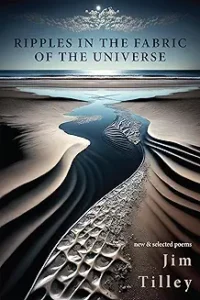Ripples in the Fabric of the Universe by Jim Tilley 2024
I never know where my next book will come from—the three libraries I patronize (the Cambridge Public, Harvard, and the Mary L. Blood Memorial Library in Brownsville, Vermont), a used bookstore, a Little Library around the corner, my overstuffed shelves in Cambridge and Vermont, a friend’s generous gift or loan, a publisher’s pre-publication volume in the mail, or one of the independent bookstores I love to browse, especially new ones when traveling.
But this volume found its way into my hands in a wonderfully generous and unanticipated way. We were at a wedding of the son of dear friends, when I struck up a conversation with a guy over our glasses of champagne. I learned he was a poet, having retired from Wall Street at a young age. Summoning all my chutzpah, I asked if he had any of his books with him, and he promptly went out to his car and gave me a copy of his recently published new and selected poems.
What a great gift as Tilley proved to be a fine poet and a discerning observer of our world. Educated as a physicist with a PhD from Harvard and having spent a few decades as an award winning investor and actuary, the world is fortunate that Tilley pivoted to writing poetry. Blurbed by two of my favorite poets, Billy Collins and Jeffrey Harrison and adding Stephen Dunn to one of his poems, it’s clear that Tilley is no amateur.
In addition to enjoying all the poems in this book and finding many lines here and there that was worth underlining and highlighting, I also found a suggestion of how to read a volume of poetry. I’ve struggled with the best way to do so. Does one read a poetry volume from front to back in one sitting or does one read a few poems and sit back to digest and ponder them? Tilley writes in his poem about Collins and Dunn entitled, ‘Billy and Stephen and Me’: “I’m the one in the hammock, reading both/on this first warm day of spring, coming from one/to the other, going back, pausing every few pages/to let the words plant themselves.” (my emphasis). I love this method and will follow it in the future.
This is another book with a major focus on fathers and sons. Tilley’s father appears often as do his two sons, and his affection and love for all three of them is evident, as is the heartbreak and difficulty of divorce, illness, loss, and life.
I could quote many other poems and stanzas and phrases, but will do so in the Poetry on the Charles section in the monthly update. Bottom line for me is that I’ve found another important poet to add to my list of favorites.



